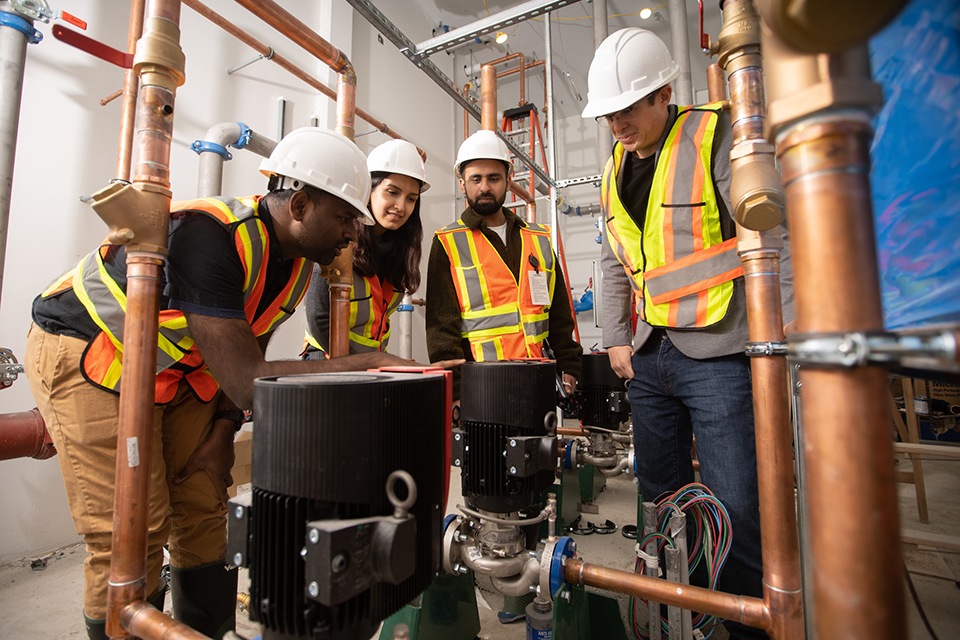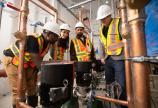Making existing buildings more energy efficient

The University of Victoria is playing a central role in a nascent industry that’s rushing to find effective, affordable ways to energy retrofit existing buildings and reduce harmful emissions.
In the global race to achieve net-zero emissions, UVic researcher Ralph Evins is leading a partnership of 16 organizations in Canada and the US that will share information and develop solutions to help businesses, governments and homeowners find more effective, affordable ways to energy retrofit existing buildings so that they’re more efficient, low-carbon and resilient to climate change.
“There are lots of options for energy retrofits but determining which one is best and cheapest for a particular type of building is very complicated,” says Evins, a civil engineer. “Right now, lots of companies are tackling different parts of the issue, but not necessarily talking to each other and probably missing some important ways that they could be learning from each other.”
The UVic-based “ReBuild Initiative” will act as a hub for knowledge co-creation and exchange between partners including small start-ups and large multi-national firms eager to become service providers, federal departments, Crown corporations and municipal governments trying to develop policies and energy rebate programs, and researchers from several universities in Canada and around the world. While services to energy retrofit existing buildings exist, they tend to be very customized and, as a result, prohibitively expensive for many building owners and homeowners.
Evins says that although many governments have set bold greenhouse gas reduction targets, most haven’t fully appreciated just how formidable this goal is when existing buildings are included in the equation. For example, while BC has a very clear and ambitious plan for new building construction with its BC Energy Step Code, existing buildings must be addressed to meet overall emission targets.
“With this project, UVic will be a centre for new ways of thinking about retrofitting existing buildings, new methods to achieve emission targets—in BC, across Canada and internationally,” says Evins.
Each ReBuild partner will contribute funding and resources and is coming to the table with a specific energy retrofit challenge they want to solve. Evins’ team of faculty, post-doctoral fellows and graduate students will work with partners to develop solutions. Many of these will involve data-driven methods, such as machine learning and computer modelling, to help analyze and classify building data and forecast energy requirements.
One ReBuild partner, Spokane-based Edo, provides organizations with technology that enables buildings to respond to the needs of the local power grid, shifting electric loads in buildings based on need and better managing electrical demand, generation and storage.
“ReBuild brings together an amazing team focused on enabling existing buildings to operate more efficiently,” says Easan Drury, Edo’s director of research and development. “As part of this unique partnership, Edo will develop tools to make efficiency and demand-response opportunities easier for utilities and building service providers to access and implement.”
The Rebuild Initiative aligns with UVic’s commitment to meet many UN Sustainable Development Goals, in particular Goal 11 (Sustainable Cities and Communities), Goal 13 (Climate Action) and Goal 7 (Affordable Clean Energy).
The initiative is being funded through more than $1 million in partner contributions and $1.1 million over three years from a Natural Sciences and Engineering Research Council of Canada Alliance Grant.
-- 30 --
To read more, view this online story.
A media kit containing high-resolution photos is available on Dropbox.
Photos
Media contacts
Ralph Evins (Engineering and Computer Science) at 250-472-5845 or revins@uvic.ca
Anne Tolson (Engineering and Computer Science Communications) at 250-812-6309 or engrcomm@uvic.ca
Robyn Quinn (University Communications + Marketing) at 250-415-7020 or scomm@uvic.ca

